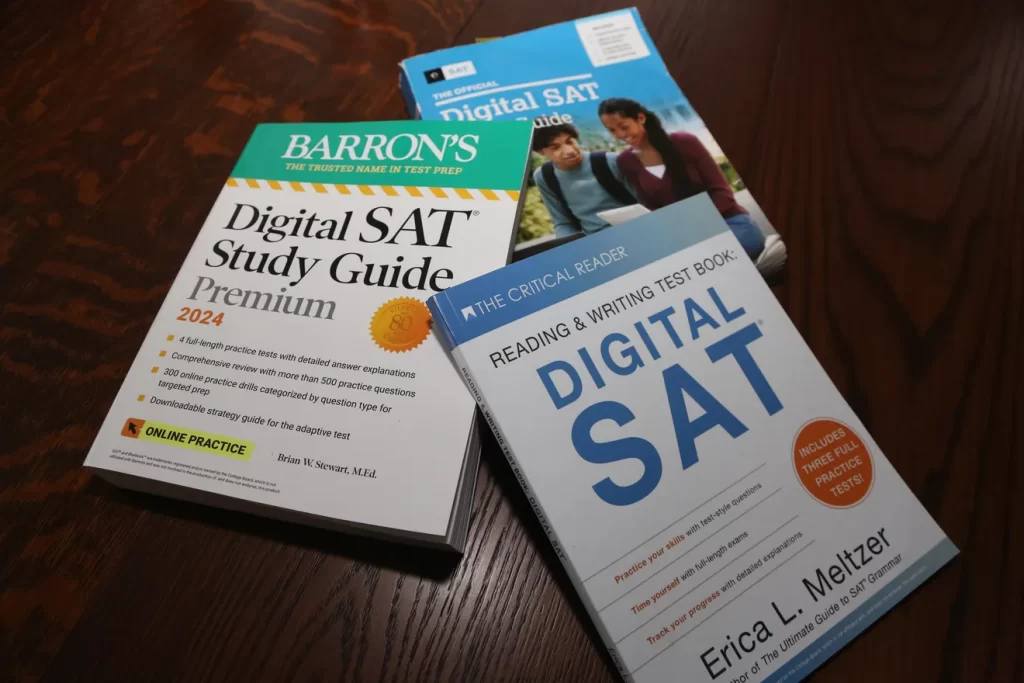SAT vs ACT: What's the Difference?

Opting for the SAT or the ACT is a major decision for international students applying to colleges in the US and other countries. The results of these standardized exams are heavily weighted in admissions decisions and are generally recognized by educational institutions. They are similar in that they both aim to determine if a student is prepared to succeed in college, but they are very different in terms of format, content, scoring, and the abilities they look for. Students throughout the world need to be aware of these distinctions so they can choose an exam that plays to their strengths and helps them achieve their academic objectives.

TABLE OF CONTENTS
SAT VS ACT: Definition
SAT: The SAT and ACT are standardized tests used for U.S. college admissions, both evaluating students’ readiness for college. The SAT emphasizes critical reading, writing, and advanced math, including trigonometry.
ACT: ACT focuses more on grammar, punctuation, and straightforward problem-solving. Both tests cover similar math topics but differ in their approach and structure.
SAT: Structure, Scores, and Skills Analyzed
To give institutions a way to compare all of their candidates, the College Board created the SAT to gauge a student’s level of preparedness for college.
Structure:
- Reading: 52 questions, 65 minutes. Reading comprehension, ability to interpret difficult texts, and evidence adequacy are all assessed in this part.
- Writing and Language: 44 questions, 35 minutes. Grammar, context-based vocabulary, and editing abilities are evaluated in this area.
- Math (No Calculator): 20 questions, 25 minutes. This section places an emphasis on algebra, solving problems, and analyzing data without a calculator.
- Math (Calculator): 38 questions, 55 minutes. Here you’ll find more advanced mathematical questions, such as those requiring knowledge of geometry and trigonometry.
- Essay (Optional): 1 prompt, 50 minutes. Essays are no longer mandated by most schools, although they still serve as assessments of students’ critical thinking and writing skills.

Scores:
The math component and the evidence-based reading and writing section of the SAT each have a score between 200 and 800 on a range from 400 to 1600. The optional essay has a possible total of 12 points, with 2–8 points allocated to each of the three components of reading, analysis, and writing.
Skills Analyzed:
The SAT is mainly designed to test your analytical, problem-solving, and critical thinking abilities. Critical thinking, evidence interpretation, and fluency with English language standards are highlighted in the Reading and Writing portions. There is an emphasis on algebra, problem-solving, and data analysis in the Math sections, and students are expected to show that they can apply mathematical ideas to real-world problems.
ACT: Structure, Scores, and Skills Analyzed
United States college admissions also heavily utilize the American College Testing (ACT), which is managed by ACT, Inc.
Structure:
- English: 75 questions, 45 minutes. Rhetorical abilities, sentence construction, punctuation, and grammar are all evaluated in this part.
- Math: 60 questions, 60 minutes. Algebra, geometry, and trigonometry are only a few of the many subjects covered in the Math area.
- Reading: 40 questions, 35 minutes. Literacy in the social sciences, the humanities, and the scientific sciences is tested here via reading comprehension passages.
- Science: 40 questions, 35 minutes. The Science portion evaluates the candidate’s ability to think critically and solve problems using evidence from the scientific community.
- Writing (Optional): 1 prompt, 40 minutes. Students must formulate and express their viewpoint on a certain topic in the Writing part.

Scores:
Each of the four components of the American College Testing System (ACT)—English, Math, Reading, and Science—is evaluated independently using a scale ranging from 1 to 36. All four of these scores add up to the composite score. You can choose to take the optional Writing component and get a score between 2 and 12, but it won’t count toward your overall score.
Skills Analyzed:
The ACT assesses a diverse set of abilities, including reasoning in mathematics (Math), reading comprehension (Reading), scientific reasoning (Science), and English grammar and use (English). Even though the test moves at a faster speed than others, some students may find the questions to be too easy.
Universities Accepting SAT and ACT Scores
Nearly every school in the United States accepts the SAT or ACT as an admissions requirement, and many more throughout the world do the same. The following is a list of fifteen prestigious schools that recognize and accept the SAT and ACT:
- Harvard University (Massachusetts)
- Stanford University (California)
- Massachusetts Institute of Technology (MIT) (Massachusetts)
- Princeton University (New Jersey)
- University of Chicago (Illinois)
- Yale University (Connecticut)
- Columbia University (New York)
- University of California, Berkeley (California)
- University of Southern California (California)
- University of Pennsylvania (Pennsylvania)
- Duke University (North Carolina)
- University of Michigan (Michigan)
- University of Texas at Austin (Texas)
- New York University (NYU) (New York)
- Northwestern University (Illinois)
These institutions are among the most prestigious in the United States, and they consider both SAT and ACT scores as part of their holistic admissions processes.
Test-Optional Policies
Many schools now have “test-optional” rules that let applicants choose whether to include standardized test results (such as SAT or ACT) in their applications. The COVID-19 pandemic has hastened this trend, which has seen many schools, including those in the Ivy League, embrace test-blind or test-optional policies.
Among the most prestigious schools that have made standardized testing optional are:
· University of California (system-wide)
According to these standards, applicants are not penalized for not submitting test scores, but they might still be asked to provide other materials, including extra essays or graded tasks.
How Colleges View SAT vs. ACT Scores?
Colleges and universities generally do not have a bias towards one test over the other when considering applicants’ SAT or ACT scores. The admissions staff is familiar with both exams and how to interpret test results within the larger application package. On the other hand, there are small geographical variations; for instance, compared to students on the East and West Coasts, those in the Midwest and South tend to favor the SAT.
To make fair comparisons between applicants who submit various test scores, many universities employ a concordance table that is offered by the College Board and ACT, Inc. This table aligns SAT and ACT scores.
ACT vs SAT: Registration Guide
To register for either the ACT or SAT for undergraduate admissions, applicants need to follow separate procedures. Here’s how to register for each:
How to Register for the ACT:
- Visit the official ACT website and sign in.
- Provide the required information and complete all steps.
- Select your preferred test center and exam date.
- Pay the registration fee to finalize your registration.
How to Register for the SAT:
- Access the College Board website and log in.
- Start the SAT registration process by filling in the necessary details step by step.
- Select your SAT test center and exam date.
- Proceed to the payment page, complete the fee payment, and finish your registration.
Which Test Should You Take?
Everyone has different skills, tastes, and test-taking techniques, so picking one over the other is a personal decision. Here are a few things to think about:
- Test Structure and Content: The SAT is a good option if you would do better on an exam that places more emphasis on analytical reasoning and quantitative reasoning. You might find the ACT to be a better fit if you have strong skills in scientific reasoning and thrive on exams with more rapid-fire questions.
- Pacing: The American College Testing System (ACT) is notoriously fast paced, meaning that pupils have less time to answer each question. Students who want to take their time and think things through might do better on the SAT because of the additional time allotted to each question.
- Math Focus: The SAT has two math parts, and one of them forbids the use of calculators. Mathematical comfort and confidence are prerequisites for this; therefore it could be a good fit for you. In contrast, the ACT’s Math component permits the use of calculators throughout.
- Science Section: Even though it assesses reasoning abilities rather than scientific knowledge, the Science section of the ACT can be useful if you have an interest inscience or are thinking about a STEM (Science, Technology, Engineering, and Mathematics) major.
Closing Remarks
Your strengths and level of comfort with each test’s structure should guide your decision between the SAT and the ACT. Your result on both examinations will have a major influence on your college admissions application, as they are essential parts of the process. Before deciding, it’s a good idea to take practice exams for both the SAT and the ACT. Then, compare your results and pick the exam that best reflects your abilities and your aspirations for college. No matter which exam you end up taking, getting ready for it in advance and planning your strategy can help you do your best and increase your chances of getting into the school of your dreams.
Don't forget to share this article




